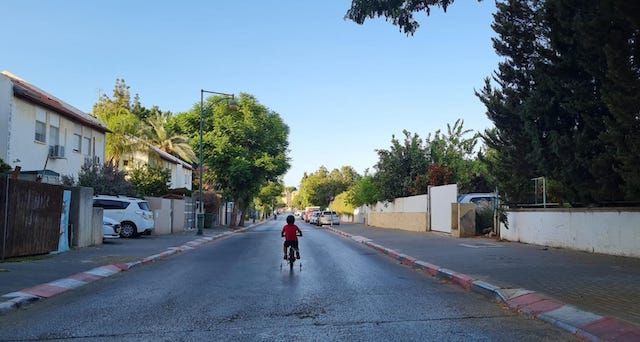Though there are numerous (and controversial) religion-based laws in Israel, my absolute favourite is the unwritten one that everyone seems to follow. For one day a year, without being told to do so, the entire country comes to a halt. In case you have yet to experience the uniqueness of Yom Kippur in Israel, allow me to tell you about it.
Once a year, for 25 hours, the country stands still. All businesses and shops are closed, no planes are flying overhead, public transportation ends, cars remain parked near the houses, and a blissful quiet comes over the land. In cities, towns, villages and kibbutzim around the country – everything slows down. Families gather for an early dinner, observant Jews set out for prayer, and the world is quiet until about an hour after sundown.
That’s when the real magic happens.
One by one, children, teens and adults swarm the empty streets. They walk, ride bikes, run around, laugh and talk. Main roads, that usually have heavy traffic, become filled with bicycles, scooters and pedestrians. Smaller streets look deserted, as one family after the other make their way out. Plastic chairs are brought out to the pavements where friends and family gather to watch passersby and chat until the small hours of the night. The topic of conversation always seems to revert to food, especially on this day of fast, until someone says it’s making them hungry and everybody laughs.
Even though everyone practices their own traditions at home, the shared space is very respectful of those observing Yom Kippur. You’ll hear no music playing or phones ringing, no backyard BBQs or delicious cooking smells rising from kitchen windows.
When prayers end, the streets are flooded with men and women dressed all in white, who make their way between the bikers and families, wishing everyone “Hatima tova.” It’s moments like these that make me believe that it is possible to live a life truly respectful of others.
As a teen, I remember cycling into town knowing I’ll be joined along the way by friends going in the same direction. None of us had phones, yet we knew exactly where to meet at the town centre. We stayed out until after midnight, and our parents never worried about us; they knew we were safe. Some of my favourite memories are from those days; having the freedom to venture out on my own surrounded by friends (and basically everybody else in my town), coupled with the sheer excitement of riding in the middle of the deserted main road.
Now a mother to a young boy, my experience is quite different yet still unique. After enjoying our traditional Tunisian couscous dinner, we get ready to go out. Armed with only his helmet and training wheels, my 5 and a half-year-old son heads off on his bike down the street. I don’t have my eyes on him most of the time, but I know he’s nearby and having fun. He meets friends along the way, races them and zig-zags between dozens of other bikers, toddlers and families having an absolute blast. I chat with friends and neighbours I pass along the way, falling even further behind my son’s lead. He stops every so often to wait for me, glares at me for being so slow and calls me a slow-poke. We reach our shul after about half an hour, both of us sweaty and flushed, the beautiful sound of singing and prayer merging with kids’ laughter and play.
We moved to this town three years ago and Yom Kippur eve is a good reminder of just how many wonderful people have come into our lives in this short time. We meet almost everyone we know on this night and return home with our hearts filled with love.
I remember the years my family spent in the UK when I was young and how strange it felt celebrating Yom Kippur without the vibrant buzzing sound of people from the streets. For those who have never had the opportunity to experience the surreal Israeli version of Yom Kippur – add it to your bucket list!

